Introduction
In the ever-evolving world of artificial plants and trees, a pivotal question arises for manufacturers and buyers alike: should the focus be on quality or quantity? This debate is not just about the number of fake plants produced but encompasses the materials, light quality, and natural aesthetics that make artificial trees almost indistinguishable from the real thing. As we delve into this comparative analysis, we will explore various aspects of the artificial plant industry, from the light spectra used to mimic natural light to the machine learning methods employed to enhance plant growth and development.
The artificial tree market, a significant part of the plant industry, has seen a shift towards using machine learning algorithms and artificial neural networks to study plant physiological responses to different environmental conditions. This research not only aids in creating plants that can withstand outdoor use all year round but also helps in understanding the human brain’s perception of real vs artificial plants.
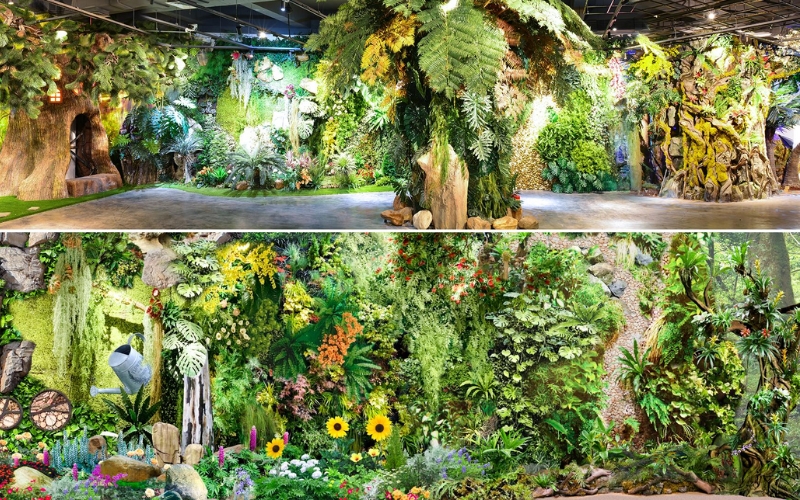
As we proceed, this article will shed light on how natural light and direct sunlight impact the quality of artificial foliage and branches, and how plant science is being integrated into the manufacturing process. The comparative analysis will also cover the cost factors and environmental considerations, making direct comparisons between real wood and its artificial counterparts.
In this industry, where trees and plants are not just products but representations of natural beauty, understanding the difference in quality and quantity is crucial. This article aims to provide a comprehensive analysis of these elements, offering insights for distributors, wholesalers, and purchasing managers in making informed decisions.
Understanding Quality in Artificial Plants
When discussing artificial plants, the term ‘quality’ transcends mere appearance. It encompasses the materials, craftsmanship, and durability that define the lifelike characteristics of these plants. High-quality artificial trees and plants are not only about replicating the natural look but also about ensuring they can withstand various types of environmental conditions without losing their aesthetic appeal.
The quality of artificial plants is often gauged by their realism. This realism is achieved through meticulous attention to detail in foliage and branches, and the use of premium materials that mimic the natural texture and color of real plants. The light quality plays a significant role here, as it affects how these plants are perceived in different lighting conditions, from natural light to direct sunlight.
Another aspect of quality in artificial plants is their durability. Unlike real ones, these plants do not require sunlight, water, or other elements of plant growth. However, they must be crafted to last, maintaining their color and form over time, even when exposed to outdoor use or various types of light. This durability often comes down to the materials used and the manufacturing process.
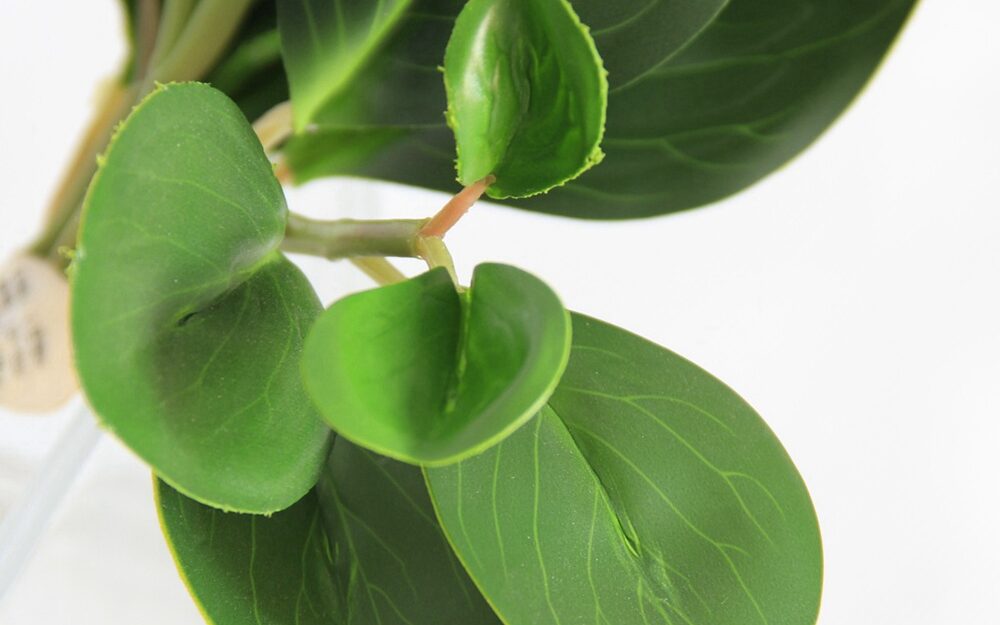
In the realm of artificial trees, quality can also be seen in the real wood used for stems and branches, adding to the realism and sturdiness of the product. The difference in quality between various types of artificial plants can be significant, influencing both their cost and their lifespan.
As we move forward in this comparative analysis, it’s essential to understand that quality in artificial plants is not just a matter of aesthetics but a comprehensive blend of materials, design, and longevity. This understanding is crucial for buyers who must determine the best value for their needs, balancing the advantages of high-quality products against their cost.
Understanding Quantity in Manufacturing
The concept of quantity in the artificial plant industry is intrinsically linked to the scale of production. Manufacturers who prioritize quantity often operate on a large scale, producing a high volume of plants and trees to meet market demands. This approach is not just about producing various types of plants in large numbers but also about the efficiency and speed of the manufacturing process.
In the world of artificial trees and plants, quantity-driven production often leverages advanced machine learning algorithms and artificial neural networks. These technologies help streamline the process, allowing for the rapid creation of plants that can be distributed to a wide market. The use of machine learning in this context is not just about quantity but also about maintaining a consistent level of quality across a large batch of products.
However, a focus on quantity can sometimes lead to compromises in quality. For instance, materials used in quantity-focused production might not match the quality of those used in smaller, more bespoke batches. This difference can affect the realism and durability of the plants, impacting their suitability for outdoor use and their ability to mimic the natural light conditions.
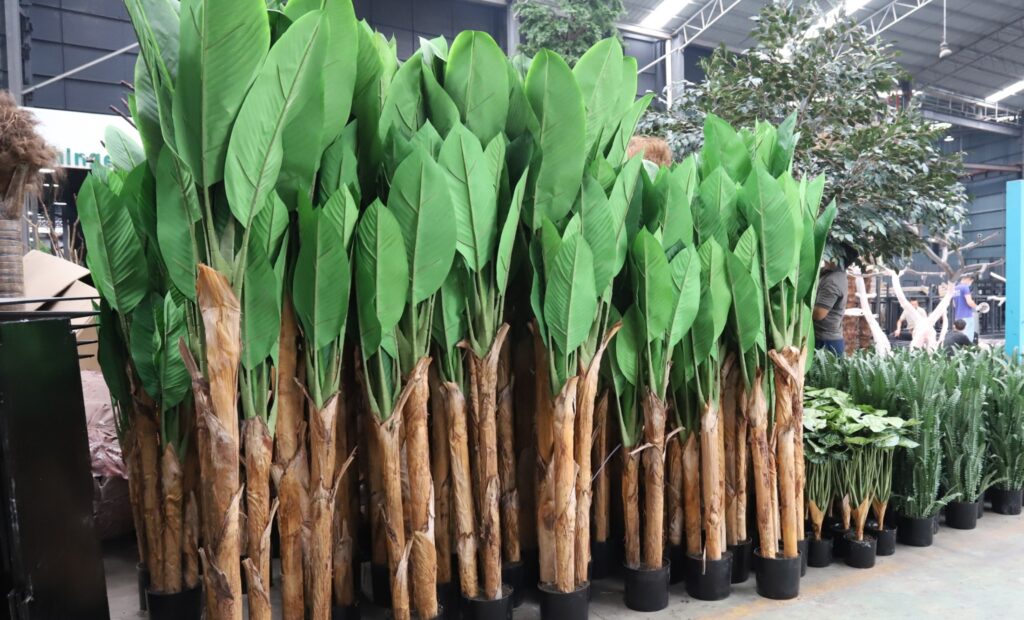
Moreover, quantity production often means a broader distribution network. This aspect involves challenges in maintaining quality control across different batches and ensuring that the final products meet the industry standards. The cost factor also plays a significant role here, as producing in larger quantities often reduces the per-unit cost, making these plants more accessible to a wider range of buyers.
As we delve deeper into this comparative analysis, it’s crucial to understand how quantity impacts not just the cost and distribution of artificial plants but also their quality and appeal in the market. This understanding is vital for buyers who need to determine the right balance between quantity and quality for their specific needs.
History of Artificial Plant Manufacturing
The industry of artificial plants and trees has a rich history that mirrors the evolution of manufacturing techniques and consumer preferences. From the early days of handcrafted foliage to the modern era of mass-produced plants, the journey is a testament to the changing dynamics of quality and quantity in production.
Initially, artificial plants were crafted with meticulous attention to detail, often involving skilled artisans. These early plants and trees were highly valued for their quality and realism, replicating natural elements with remarkable accuracy. However, the process was time-consuming and costly, limiting the quantity that could be produced.
As the industry evolved, technological advancements, particularly in machine learning and automation, began to shape the production of artificial plants. The introduction of machine learning methods and algorithms allowed for the standardization of plants, ensuring consistent quality while significantly increasing quantity. This shift marked a significant change in how artificial trees and plants were perceived and valued in the market.
The use of various types of materials also evolved. Initially, real wood and high-quality plastics were common, but as the demand for more affordable options grew, manufacturers began exploring different materials to reduce costs. This shift had implications for both the quality and durability of the plants, especially in terms of their response to natural light and suitability for outdoor use.
Today, the artificial plant industry stands at a crossroads where quality and quantity are both critical. While some manufacturers focus on producing plants and trees that closely mimic real ones in natural environments, others prioritize large-scale production to cater to a broader market. This evolution reflects the diverse needs and preferences of buyers, who must navigate these differences to find products that meet their specific requirements.

Case Study: High-Quality Manufacturers
In the realm of artificial plants, high-quality manufacturers stand out for their commitment to excellence in every aspect of production. These manufacturers prioritize quality over quantity, ensuring that each artificial tree and plant they produce meets the highest standards of realism and durability.
One such manufacturer, renowned in the industry, uses a combination of real wood and premium synthetic materials to create artificial trees that are nearly indistinguishable from their natural counterparts. The light quality these plants receive during production is carefully controlled to ensure that they maintain their color and texture in various types of natural light, including direct sunlight.
These high-quality manufacturers often employ machine learning algorithms to analyze data collected from real plants, allowing them to replicate the natural physiological responses of plants to environmental conditions. This approach results in artificial plants that not only look real but also adapt to light spectra in a way that mimics natural plant growth.
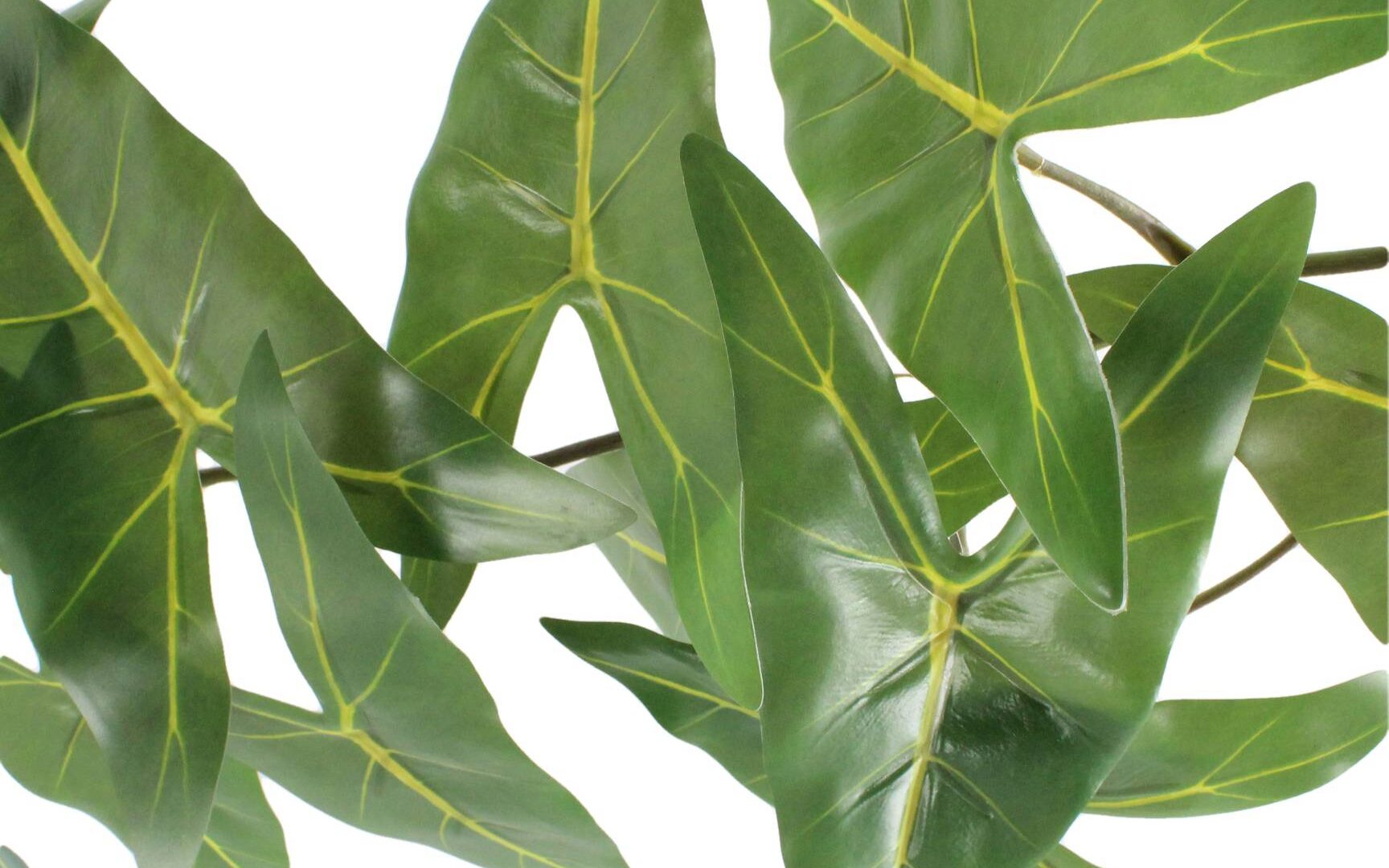
The process of creating these plants is meticulous, with a focus on craftsmanship and attention to detail. From the foliage to the branches, every element is crafted to reflect the characteristics of real plants, including their response to light and environmental factors. This level of quality ensures that the plants are suitable for both indoor and outdoor use, offering advantages in terms of aesthetics and longevity.
For buyers, these high-quality artificial plants represent an investment in durability and aesthetic appeal. While the cost may be higher compared to mass-produced items, the advantages in terms of quality and lifespan make them a valuable addition to any setting, be it commercial or residential.
Case Study: High-Quantity Manufacturers
In contrast to their high-quality counterparts, high-quantity manufacturers in the artificial plant industry focus on producing a large volume of plants and trees. This approach prioritizes quantity, aiming to meet the high demand in the market, often at a lower cost per unit.
A notable example in this category is a manufacturer known for its extensive production line of artificial trees and plants. This company utilizes advanced machine learning methods and artificial neural networks to optimize their production process. The data obtained from these systems helps streamline operations, allowing for the mass production of plants with consistent quality.
While the focus is on quantity, these manufacturers still maintain a standard of quality that meets basic market requirements. The materials used, though not as high-end as those in luxury artificial plants, are durable and capable of withstanding various environmental conditions, including exposure to natural light and direct sunlight.
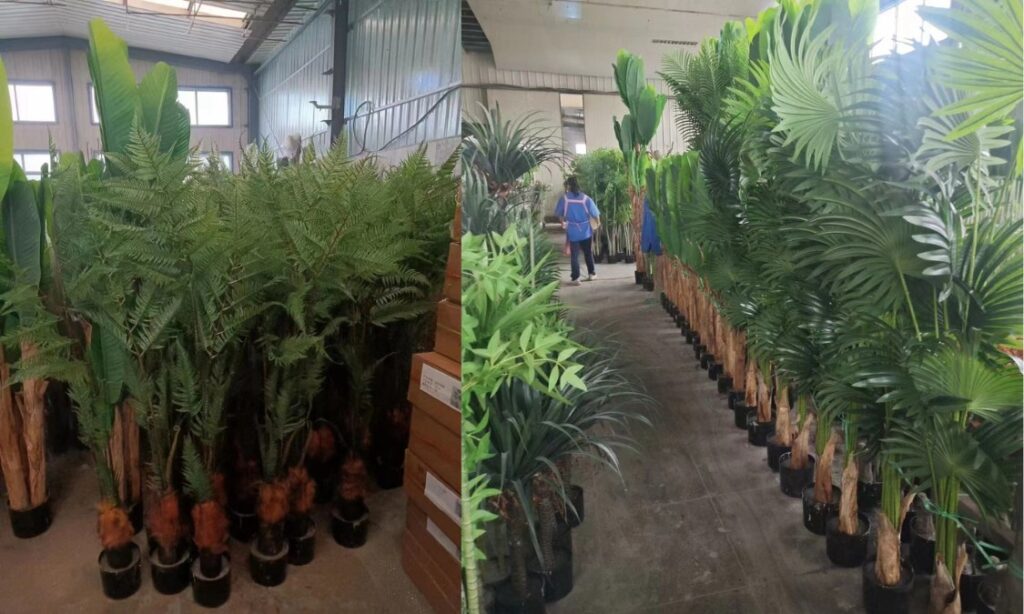
The light quality in these manufacturing facilities is designed to ensure that the plants retain their color and texture for a reasonable period, making them suitable for both indoor and outdoor use. However, the difference in the quality of materials and craftsmanship is often evident when compared to higher-end products.
For buyers, these quantity-focused artificial plants offer a cost-effective solution, especially for large-scale projects or where the cost is a significant factor. While they may not have the intricate details and realism of more expensive plants, they provide a functional and aesthetically pleasing alternative for various types of settings.
Environmental Considerations and Sustainability
In the artificial plant industry, environmental considerations and sustainability play a crucial role in shaping manufacturing practices. Both quality- and quantity-focused manufacturers must navigate these considerations to meet the evolving demands of environmentally conscious buyers.
Sustainability in artificial tree and plant production involves the use of eco-friendly materials and processes that minimize environmental impact. High-quality manufacturers often use sustainable materials that not only enhance the realism of the plants but also ensure they are safe for both indoor and outdoor use. These materials are selected for their durability and ability to withstand various types of light, including natural light and direct sunlight.
On the other hand, quantity-focused manufacturers face the challenge of balancing large-scale production with environmental responsibility. This balance often involves optimizing the manufacturing process to reduce waste and energy consumption. The use of machine learning and artificial neural networks can aid in this process, allowing for more efficient use of resources and reducing the overall environmental footprint.
The light quality used in the production of artificial plants also has environmental implications. Manufacturers are increasingly exploring energy-efficient lighting solutions that mimic natural light without the high energy costs associated with traditional lighting methods.
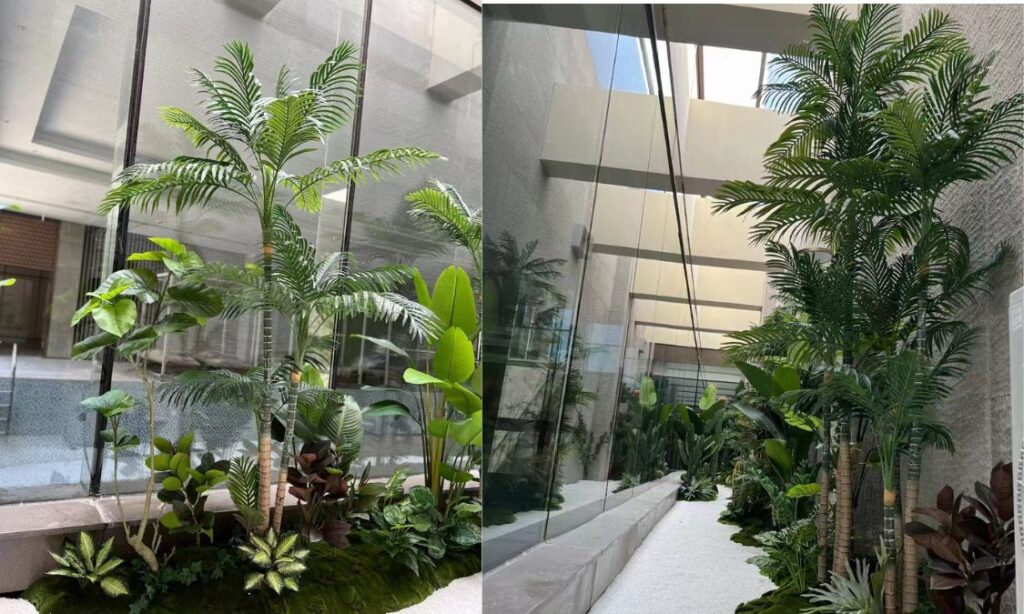
For buyers, understanding the environmental impact of their choices is crucial. Artificial plants offer the advantage of not requiring the water, soil, and sunlight needed for real plants, reducing the environmental impact associated with traditional gardening. However, the materials and production methods used in creating these plants also need to be considered from a sustainability perspective.
In summary, environmental considerations and sustainability are key factors in the artificial plant industry, influencing both quality and quantity aspects of production. As the industry continues to evolve, these considerations will remain at the forefront of manufacturing practices, ensuring that artificial plants are not only aesthetically pleasing but also environmentally responsible.
Customization in Artificial Plant Manufacturing
Customization plays a pivotal role in the artificial plant industry, bridging the gap between quality and quantity. It allows manufacturers to cater to specific buyer needs, whether they are looking for unique artificial trees for a special project or a large batch of plants for commercial use.
High-quality manufacturers excel in offering customization options. These options range from choosing specific materials to match the realism of natural plants, to adjusting the light quality requirements to ensure the plants look their best in any setting. Customization in this segment often involves handcrafted foliage and branches, allowing for a high degree of detail and realism.
In the realm of quantity production, customization is more about scalability and adaptability. Manufacturers use machine learning algorithms and artificial neural networks to quickly adjust production lines to create various types of plants in response to market trends. This flexibility allows for the production of plants that meet specific size, color, and design requirements, even on a large scale.
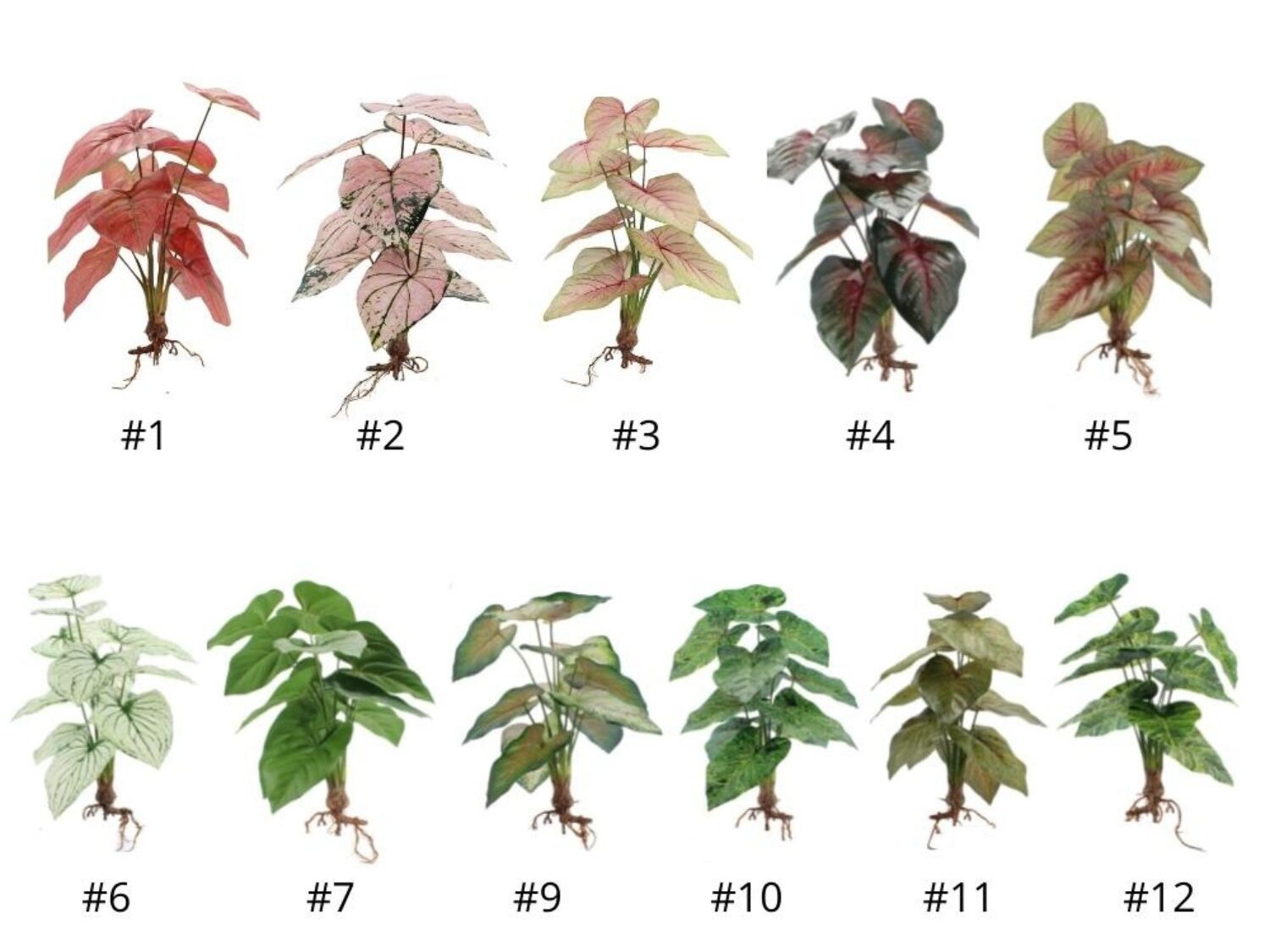
Customization also extends to the environmental conditions these plants are designed for. Whether it’s ensuring plants can withstand direct sunlight and outdoor use, or designing them to thrive in low natural light conditions, customization ensures that the plants meet the functional and aesthetic needs of the buyers.
For buyers, the ability to customize artificial plants offers a significant advantage. It allows them to select plants that not only fit their specific design criteria but also align with their cost considerations and environmental preferences. Customization in the artificial plant industry thus represents a convergence of quality, quantity, and buyer-specific needs, making it a key factor in the purchasing decision.
Market Trends and Buyer Preferences
Understanding market trends and buyer preferences is crucial in the artificial plant industry, as it influences both quality and quantity aspects of production. The trends in this sector reflect a dynamic interplay between the evolving tastes of buyers and the technological capabilities of manufacturers.
Recent trends show an increasing demand for artificial trees and plants that closely mimic real plants. This demand is driven by a desire for natural-looking plants that require minimal maintenance. High-quality manufacturers respond to this trend by using superior materials and intricate designs to create plants that offer the realism and aesthetic appeal of real ones.
In terms of quantity, there is a growing market for affordable artificial plants for large-scale commercial and residential projects. Manufacturers focusing on quantity production are leveraging machine learning and artificial neural networks to efficiently produce large volumes of plants that meet basic aesthetic and durability standards.

Another significant trend is the demand for sustainable and eco-friendly plants. Buyers are increasingly conscious of the environmental impact of their purchases, leading to a preference for plants made from recycled or sustainable materials. Both quality- and quantity-focused manufacturers are adapting to this trend by incorporating sustainable practices into their production processes.
The preference for customized plants is also on the rise. Buyers are looking for plants that can be tailored to their specific design and environmental conditions, whether for indoor or outdoor use. This trend is pushing manufacturers to offer more flexible and personalized options, catering to a diverse range of buyer needs.
In summary, market trends and buyer preferences in the artificial plant industry are shaping the way manufacturers approach quality and quantity. Keeping abreast of these trends is essential for manufacturers to stay competitive and meet the changing needs of their buyers.
Global Distribution and Logistics in Artificial Plant Manufacturing
The global distribution and logistics of artificial plants play a significant role in the industry, impacting both quality and quantity aspects of the business. Efficient distribution systems are crucial for manufacturers to reach their target markets, particularly in key export countries.
For high-quality artificial tree and plant manufacturers, distribution involves careful handling and packaging to maintain the integrity of their products. These manufacturers often work with specialized logistics providers to ensure that their plants, known for their intricate details and delicate foliage, are transported without damage. This attention to logistics underscores their commitment to delivering quality products to buyers worldwide.
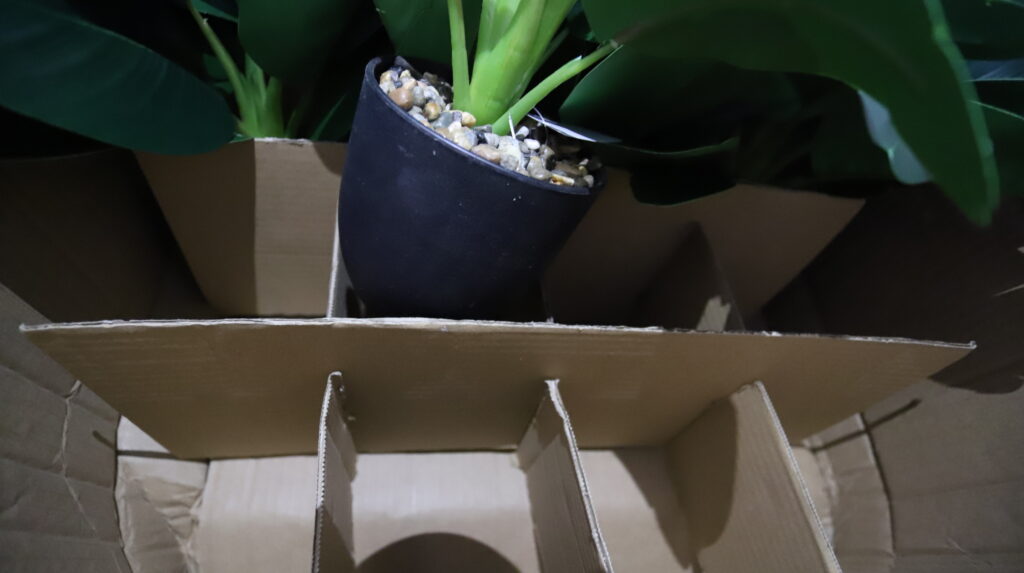
In contrast, manufacturers focused on quantity production face different logistics challenges. Their primary concern is to efficiently transport large volumes of artificial plants to various global destinations. This often involves optimizing the packing process and working with logistics partners to manage the complexities of large-scale shipments. Despite the focus on volume, these manufacturers still ensure that their products are delivered in good condition, meeting the basic quality expectations of their buyers.
The distribution process also includes navigating the regulatory and customs environments of different countries. Manufacturers must be aware of the import regulations and standards in their target markets, particularly in South Africa, America, Canada, and Europe, to ensure smooth and compliant entry of their products.
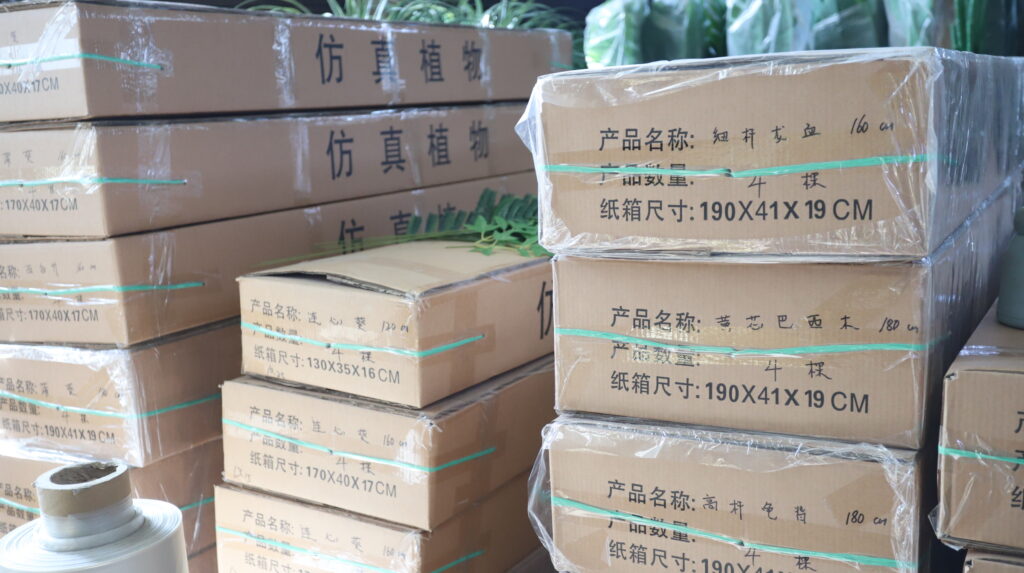
For buyers, the efficiency and reliability of a manufacturer’s distribution and logistics network are key considerations. They seek assurance that their orders, whether small or large, will be delivered on time and in good condition. This aspect of the artificial plant industry is therefore critical in building trust and maintaining long-term relationships with buyers.
Innovation and Future Trends in Artificial Plant Manufacturing
Innovation is a driving force in the artificial plant industry, shaping both current practices and future trends. As manufacturers strive to balance quality and quantity, staying ahead with innovative approaches is key to their success.
One area of innovation is the use of advanced machine learning algorithms and artificial neural networks in the production of artificial trees and plants. These technologies enable manufacturers to analyze complex data related to plant growth and light spectra, leading to the creation of more lifelike and durable plants. This technological advancement not only improves the quality of the products but also enhances the efficiency of production processes, addressing both quality and quantity needs.
Looking towards the future, the industry is likely to see an increased focus on sustainability. This includes the development of eco-friendly materials and production methods that reduce the environmental impact of artificial plants. Manufacturers who prioritize sustainability in their production processes will likely gain a competitive edge, as buyers are increasingly drawn to environmentally responsible products.

Another emerging trend is the customization of artificial plants. With advancements in technology, manufacturers can offer a wider range of customization options, allowing buyers to tailor products to their specific needs and preferences. This trend is expected to grow, as it provides a unique selling point that appeals to a diverse range of buyers.
In summary, innovation and future trends in the artificial plant industry are centered around technological advancements, sustainability, and customization. These trends are shaping the way manufacturers approach production, ensuring that they can meet the evolving demands of the market while maintaining a balance between quality and quantity.
Online Marketing and Digital Presence in Artificial Plant Manufacturing
In today’s digital age, online marketing and a strong digital presence are essential for success in the artificial plant industry. These elements play a crucial role in how manufacturers communicate their balance of quality and quantity to potential buyers.
A robust online presence allows manufacturers of artificial trees and plants to showcase their products to a global audience. High-quality manufacturers often use their digital platforms to highlight the intricate details and superior materials of their plants, appealing to buyers looking for realism and natural aesthetics. High-resolution images, virtual showrooms, and detailed product descriptions are effective tools in conveying the quality of these plants.
For manufacturers focusing on quantity, online platforms offer an opportunity to demonstrate the scale of their operations and the wide range of plants they produce. They can use their websites and social media channels to showcase the diversity of their product lines, emphasizing their ability to meet large orders and varied buyer requirements.
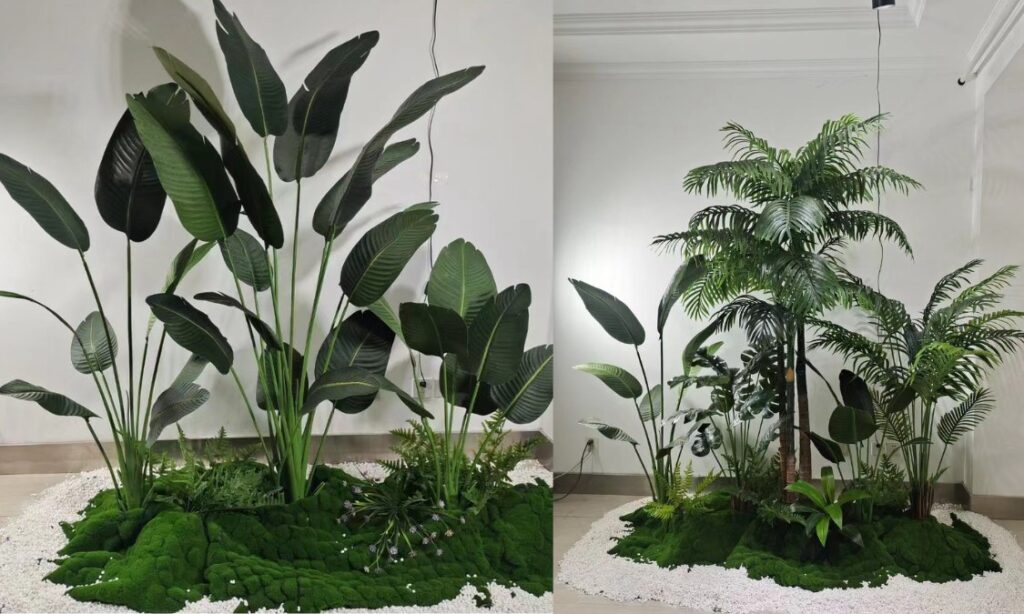
Online marketing strategies, such as search engine optimization (SEO) and targeted advertising, are also crucial. By incorporating relevant keywords and engaging content, manufacturers can improve their visibility in search engine results, making it easier for potential buyers to find them. This is particularly important in a competitive market, where visibility can significantly impact a manufacturer’s ability to attract and retain buyers.
Furthermore, digital platforms provide an avenue for manufacturers to engage with their audience. Through social media, blogs, and newsletters, manufacturers can share updates, industry insights, and helpful information, building a relationship with their audience and establishing themselves as thought leaders in the artificial plant industry.
In conclusion, online marketing and digital presence are key components in the artificial plant industry. They enable manufacturers to effectively communicate their quality and quantity offerings, engage with their audience, and stay competitive in a rapidly evolving digital marketplace.
Technological Advancements in Artificial Plant Manufacturing
The artificial plant industry is witnessing significant technological advancements, particularly in the areas of machine learning methods, artificial neural networks, and light quality improvements. These advancements are not only enhancing the quality of artificial trees and plants but also revolutionizing the manufacturing process.
Machine learning algorithms are being increasingly used to analyze data collected from various sources, including direct sunlight exposure and light spectra. This data helps in understanding the physiological responses of real plants to environmental stimuli, which can then be replicated in artificial plants. The use of machine learning in this context ensures that artificial trees and plants are more lifelike, responding to natural light in a way that mimics real plants.

The development of artificial plants also benefits from experimental design and comparative analysis of different materials and methods. This research-driven approach leads to innovations in plant development, including the use of real wood and branches to enhance the natural look and feel of the products.
Environmental conditions are also a significant factor in the industry. Manufacturers are increasingly focusing on creating plants that can withstand various outdoor use conditions, such as exposure to different light intensities and weather elements. This has led to the development of plants that can be used year round, offering greater versatility and value to buyers.
In terms of plant science, there is a growing interest in understanding the human brain’s response to artificial plants. Research in this area is exploring how different plants can affect mood and cognitive function, leading to more targeted and effective product designs.
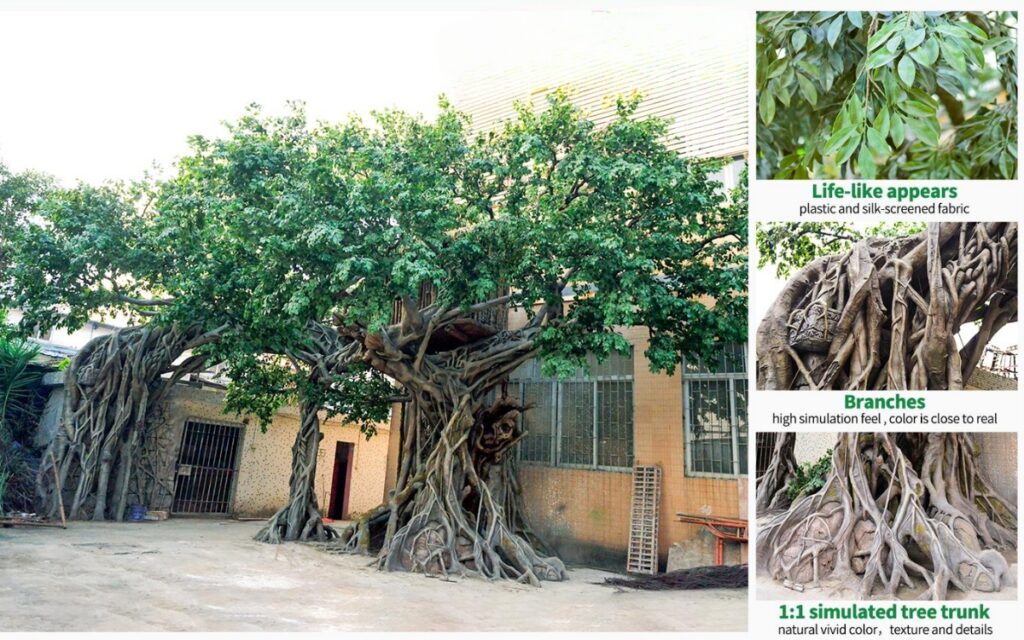
As the industry evolves, manufacturers are also considering the cost factors associated with these technological advancements. Balancing the cost of innovation with the need to offer competitive pricing is a key challenge, but one that is essential for long-term success in the market.
In conclusion, technological advancements are playing a pivotal role in shaping the future of the artificial plant industry. By embracing these changes, manufacturers can continue to offer products that meet the evolving needs and preferences of their buyers, ensuring their place in a competitive and dynamic market.
Environmental Impact and Sustainability in Artificial Plant Manufacturing
The artificial plant industry is increasingly focusing on environmental impact and sustainability, recognizing the importance of these factors in manufacturing artificial trees and plants. This shift is not only a response to global environmental concerns but also a reflection of consumer preferences.
Sustainable practices in the production of artificial plants involve the use of eco-friendly materials and energy-efficient manufacturing methods. Manufacturers are exploring ways to minimize waste and reduce the carbon footprint of their operations. This includes recycling initiatives and the use of renewable energy sources in their production process.
The development of artificial plants with a focus on sustainability also involves considering the environment in which they will be used. Manufacturers are creating products that are durable and suitable for outdoor use, reducing the need for frequent replacements and thereby lessening environmental impact.

In terms of plant science, there is an emphasis on creating artificial plants that have a positive effect on the environment. This includes plants that require minimal maintenance and do not need resources like water, soil, or natural light, making them an environmentally friendly alternative to real plants.
The industry is also seeing a trend towards plants made from recycled or biodegradable materials, further enhancing their sustainability profile. These plants not only look and feel natural but also align with the growing consumer demand for environmentally responsible products.
Cost considerations are also integral to the adoption of sustainable practices. Manufacturers are finding ways to make sustainable artificial plants cost-effective, ensuring that they remain accessible to a wide range of buyers.
In conclusion, the focus on environmental impact and sustainability is reshaping the artificial plant industry. By adopting eco-friendly practices and materials, manufacturers are not only contributing to environmental conservation but also meeting the demands of environmentally conscious buyers, ensuring the long-term viability of their businesses.
Global Market Trends and Export Strategies in Artificial Plant Manufacturing
Understanding global market trends is crucial for manufacturers in the artificial plant industry, especially when considering export strategies. As the demand for artificial trees and plants grows worldwide, manufacturers must adapt their strategies to meet the diverse needs of international markets.
One of the key trends in the global market is the increasing demand for high-quality artificial plants that closely mimic real plants. This has led manufacturers to focus on the quality of materials and craftsmanship in their products. The use of real wood and attention to detail in foliage and branches are aspects that appeal to international buyers looking for natural-looking plants.
Another trend is the growing preference for artificial plants in commercial spaces. Businesses are increasingly using artificial trees and plants for interior decoration due to their low maintenance and long-lasting nature. This shift presents an opportunity for manufacturers to expand their product lines to include plants suitable for commercial use, considering factors like size, durability, and suitability for various environmental conditions.

In terms of export strategies, manufacturers are focusing on building strong relationships with distributors and wholesalers in key export markets. This involves understanding the specific needs and preferences of different regions, such as light requirements, preferred types of plants, and cost considerations.
Digital marketing and online sales channels are also becoming increasingly important in reaching global customers. Manufacturers are leveraging platforms like Alibaba and other e-commerce sites to showcase their products and connect with buyers from around the world.
Furthermore, manufacturers are paying close attention to logistics and distribution methods to ensure efficient and cost-effective delivery of their products. This includes optimizing packaging for safe and economical shipping and navigating international trade regulations.
In conclusion, staying attuned to global market trends and developing effective export strategies are key for manufacturers in the artificial plant industry. By focusing on quality, expanding product lines, building strong distribution networks, and utilizing digital platforms, manufacturers can successfully navigate the complexities of the international market.
Innovation and Research in Artificial Plant Manufacturing
Innovation and research are driving forces in the artificial plant industry, leading to significant advancements in the quality and realism of artificial trees and plants. These efforts are crucial in meeting the evolving demands of both commercial and residential markets.
A key area of research involves studying the physiological responses of real plants to environmental conditions. This includes understanding how plants respond to light, particularly far red light, which is known to influence plant growth and chlorophyll production. By incorporating these findings, manufacturers can develop artificial plants that more closely resemble the real thing.
Experimental design in plant science is also contributing to the development of artificial plants. Researchers are using comparative analysis of different materials and methods to create plants that not only look natural but also feel like real plants. This involves exploring various types of foliage, branches, and even real wood to enhance the overall aesthetic and tactile experience.
The use of machine learning algorithms and artificial neural networks is another innovative approach in the industry. These technologies are being applied to automatically adjust the appearance of artificial plants based on light conditions, mimicking the way living organisms react to changes in their environment.

Manufacturers are also focusing on environmental conditions for outdoor use. This includes developing plants that can withstand different weather conditions and maintain their appearance year round. The research and development in this area are crucial for manufacturers aiming to cater to the outdoor decor market.
In conclusion, innovation and research are essential in the artificial plant industry. By continuously exploring new materials, technologies, and methods, manufacturers can create plants that are not only aesthetically pleasing but also environmentally friendly and suitable for a wide range of applications.
Sinofloral: Pioneering Quality and Innovation in Artificial Plants
Sinofloral, has been at the forefront of quality and innovation in the artificial plant industry. Our commitment to excellence is evident in our wide range of artificial trees and plants, which are renowned for their lifelike appearance and durability.
1. Emphasis on High-Quality Materials and Craftsmanship
At Sinofloral, we understand that the quality of materials is paramount in creating realistic artificial plants. We use only the finest materials, including real wood for stems and branches, to ensure our products not only look but also feel like the real thing. Our meticulous attention to detail in foliage design sets us apart in the industry.
2. Advanced Manufacturing Techniques
Leveraging the latest in machine learning and artificial neural networks, Sinofloral has developed cutting-edge manufacturing techniques. These technologies allow our plants to automatically adjust to different light conditions, closely mimicking the natural responses of living organisms.
3. Sustainable and Eco-Friendly Practices
Sustainability is at the core of our operations. We prioritize eco-friendly practices in our production process, ensuring minimal environmental impact. Our plants are designed for outdoor use, capable of withstanding various environmental conditions and lasting year round.

4. Tailored Solutions for Global Markets
Understanding the diverse needs of our international clientele, Sinofloral offers tailored solutions to meet specific regional requirements. Our research and development team works tirelessly to ensure our plants cater to the unique sunlight, light, and environmental needs of different markets.
5. Exceptional Customer Service and After-Sales Support
At Sinofloral, customer satisfaction is our top priority. Our efficient sales team is dedicated to providing exceptional service, from offering free catalogs to ensuring prompt after-sales support. We believe in building lasting relationships with our clients, ensuring they receive the best possible experience.
In conclusion, Sinofloral’s dedication to quality, innovation, and sustainability makes us a leader in the artificial plant industry. Our commitment to our customers and our pioneering approach in manufacturing and design set us apart as the go-to source for premium artificial plants.
Sinofloral’s Unique Offerings: Customization and Variety
1.Customization at Its Best
At Sinofloral, we understand that each client has unique needs. That’s why we offer unparalleled customization options. Whether it’s adjusting the size, shape, or color of our artificial plants, we ensure that our products align perfectly with our clients’ specific requirements. This level of customization extends to our artificial trees as well, providing a diverse range of options for our B2B clients.
2. A Wide Range of Products for Diverse Needs
Our product range is extensive, covering everything from artificial trees and plants to wreaths, garlands, and wired ribbons. This variety ensures that we cater to a broad spectrum of tastes and preferences, making Sinofloral a one-stop shop for all artificial plant needs. Our plants are suitable for both indoor and outdoor use, offering versatility and convenience to our clients.
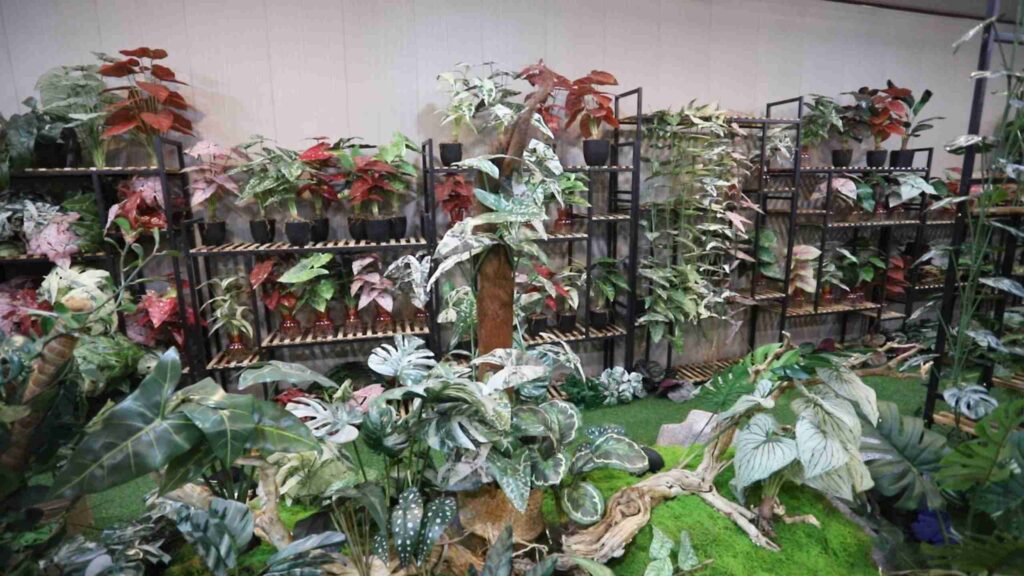
3. Leading the Way in Artificial Plant Technology
Sinofloral is not just about traditional artificial plants. We are pioneers in integrating advanced technologies like machine learning and artificial neural networks into our products. This innovative approach allows our plants to adapt to changing environmental conditions, ensuring they remain vibrant and lifelike in any setting.
4. Global Reach and Reliable Distribution
With a strong presence in main export countries like South Africa, America, Canada, and Europe, Sinofloral has established a robust global distribution network. This ensures timely and efficient delivery of our products worldwide, making us a reliable partner for international wholesalers and distributors.
5. Competitive Pricing Without Compromising Quality
At Sinofloral, we believe in offering the best value to our clients. Our competitive pricing, coupled with our commitment to high-quality materials and craftsmanship, ensures that our clients receive the best products at the most reasonable prices. This approach has helped us build a loyal customer base and a strong reputation in the industry.
In summary, Sinofloral’s dedication to customization, variety, technological innovation, global reach, and competitive pricing makes us a distinguished name in the artificial plant industry. Our commitment to meeting and exceeding client expectations is what drives our continued success and growth.
Sinofloral’s Commitment to Sustainability and Ethical Practices
Eco-Friendly Approach in Production
Sinofloral takes pride in its eco-friendly approach to manufacturing artificial plants. We use sustainable materials and processes that minimize environmental impact. Our commitment to green practices is not just a part of our business ethos; it’s a promise to our planet and future generations.
Ethical Manufacturing and Labor Practices
We believe in fair and ethical labor practices. Our production facilities in China adhere to the highest standards of worker safety and rights. This ethical approach extends to every aspect of our business, ensuring that our clients can trust not only the quality of our products but also the integrity of their creation.
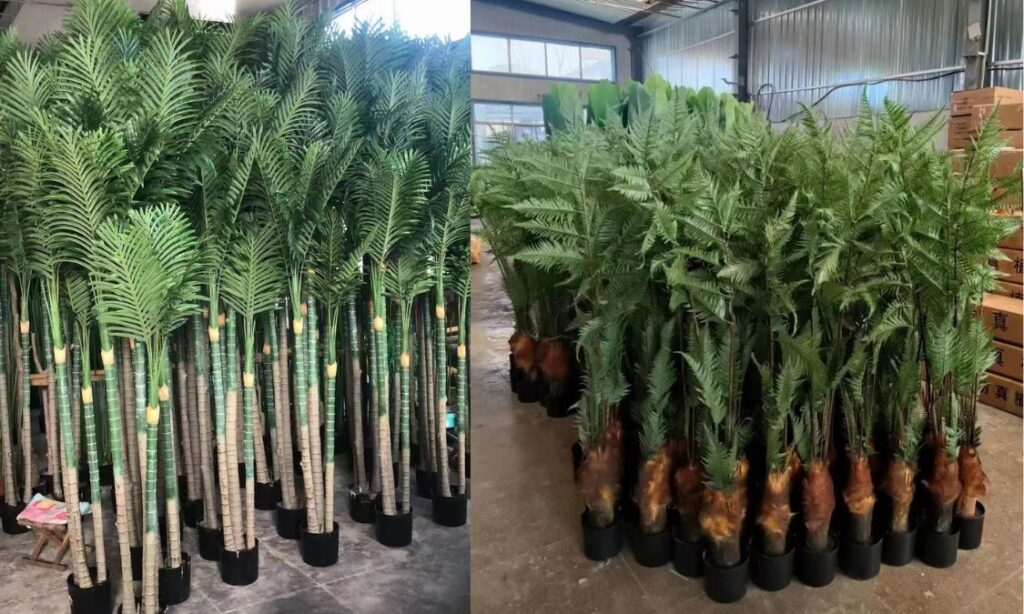
Continuous Improvement and Innovation
Our journey doesn’t stop at current successes. Sinofloral is dedicated to continuous improvement and innovation. We regularly update our product lines and manufacturing techniques to stay ahead in the artificial plant industry. Our R&D team is constantly exploring new ideas to enhance the realism and quality of our products.
Building Strong Relationships with Our Global Clients
Understanding and Meeting Client Needs
At Sinofloral, we don’t just sell products; we build relationships. Understanding and meeting our clients’ needs is at the heart of our business. Our experienced sales team works closely with each client, ensuring their specific requirements are met with the utmost attention and professionalism.
After-Sales Service and Support
Our commitment to our clients extends beyond the sale. We offer comprehensive after-sales service and support, ensuring that any issues are promptly addressed and resolved. Our goal is to ensure complete satisfaction with every purchase, fostering long-term partnerships with our clients.
Participating in Global Trade Shows and Events
Sinofloral actively participates in major global trade shows and industry events. These platforms allow us to showcase our latest products, connect with existing and potential clients, and stay abreast of the latest trends and developments in the artificial plant industry.
Conclusion: Sinofloral – Your Trusted Partner in Artificial Plants
A Legacy of Excellence and Trust
Since found, Sinofloral has built a legacy of excellence and trust in the artificial plant industry. Our commitment to quality, innovation, sustainability, and customer satisfaction has made us a trusted partner for distributors, wholesalers, and buyer agencies worldwide.
Inviting You to Explore Our World-Class Collection
We invite you to explore our world-class collection of artificial plants, trees, and floral accessories. Discover the Sinofloral difference and how our products can enhance your business offerings.
Join Us on Our Journey to Excellence
Join us on our journey to excellence. With Sinofloral, you’re not just choosing a product; you’re choosing a partner committed to quality, innovation, and your success in the ever-evolving world of artificial plants.
In conclusion, Sinofloral stands as a beacon of quality, innovation, and customer-centric service in the artificial plant industry. We look forward to building a successful and sustainable future with our valued clients.

